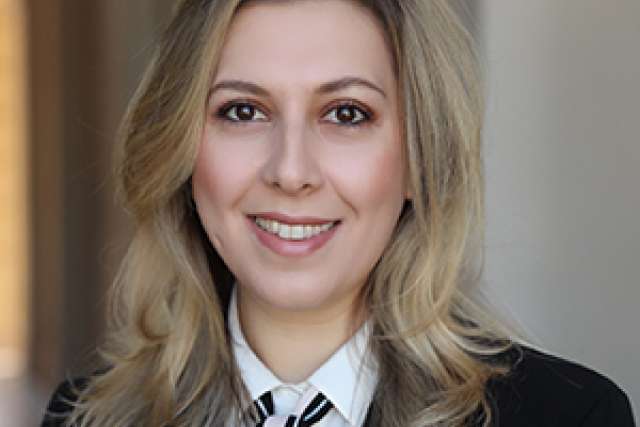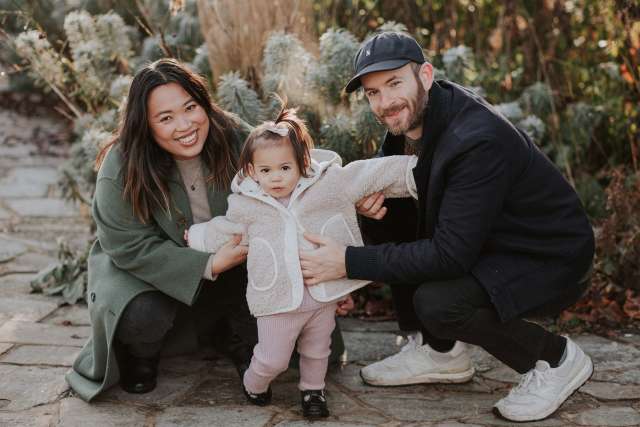For Yudy Machado, getting lung cancer screening was a no-brainer.
She had smoked for more than 50 years. Even though she was not experiencing specific symptoms, Machado’s doctor, back in 2020, advised her to get screened for lung cancer after hearing that she smoked a pack a day. While Machado’s initial imaging test showed abnormalities – specifically a nodule – a biopsy proved inconclusive.
At the advice of her friend who had recently become lung cancer-free after undergoing surgery at UCLA Health, Machado, 68, decided to follow the same path in the summer of 2023.
At UCLA Health, Machado underwent annual screening, said Amy Cummings, MD, PhD, Machado’s thoracic oncologist and director of the Office of Cancer Justice, Equity, Diversity and Inclusion at the UCLA Health Jonsson Comprehensive Cancer Center. The results conclusively showed that the mass spotted during her screening in 2020 was continuing to grow three years later, she said.
Machado underwent another biopsy at UCLA Health that confirmed the tumor in her right lung was cancerous. She had stage 1 lung cancer.
“If I hadn’t gone to cancer screening or gotten that test, I wouldn’t have known I had lung cancer,” Machado said. “It’s so much better to catch it when it’s at stage 1 than when it goes to stage 3 or stage 4 – when you may have to get a lung removed or not be able to get rid of the cancer.”
Molecular testing leads to clinical trial
As part of standard lung cancer testing, Machado’s biopsy underwent molecular sequencing, which looks for changes in a tumor’s DNA. This testing revealed that Machado’s lung cancer had a special mutation that helped it grow, and that she was eligible for an experimental drug before her surgery as part of a clinical trial.
Hearing that even with stage 1 cancer she still had a 20% chance of having the cancer come back, Machado opted for the trial and experimental drug, which she started in December 2023.
By the time she underwent minimally invasive robotic surgery at UCLA Health in February 2024, this drug had killed nearly all of the cancer cells in her tumor. She is now cancer-free and has quit smoking, but needs to be monitored periodically. She did have side effects such as occasional vomiting and diarrhea from the medication for about a month, and she still has pain on one side after surgery.
“But, of course, I’m happy that I was able to find out early,” she said. “I would absolutely recommend screening.”
The molecular testing Machado underwent helped qualify her for the clinical trial, said Dr. Cummings, who is also assistant professor in the Division of Hematology/Oncology at the David Geffen School of Medicine at UCLA.
“We’re lucky because at UCLA Health we have the ability to participate in clinical trials that drive the field forward,” she said. “We know that even early-stage lung cancer can come back, but we’re making great progress. In the past few years, we have dramatically changed how we treat early-stage lung cancer because of clinical trials that help people live better and longer. Yudy got to be a part of that. And in doing so, has helped so many people, because now we know what this drug can do.”
Life-saving screening
Machado is an example of how timely lung cancer screening can help save a person’s life, Dr. Cummings said. Machado’s story is one of many that Dr. Cummings hopes will motivate more people to get screened for lung cancer, which is the second leading cancer behind breast cancer for women and prostate cancer for men.
The screening process is as simple as it gets, Dr. Cummings said.
“You go to an imaging facility and lie on your back for 10 minutes at the most,” she said. “You don’t need an IV. You don’t need blood work. It’s quick, easy, and painless, and just once a year from when you’re 50 to 80 years old.”
She said most will have a negative or normal scan, although if abnormalities are found, additional testing may be needed. Only about 1% of those who are screened will be diagnosed with lung cancer, Dr. Cummings said.
“So, if you are in the majority, you have peace of mind year after year.”
Dr. Cummings also recommends that anyone who has questions about lung cancer screening visit the University of California Lung Cancer Consortium website, ucscreenca.org, which provides them with the tools to see if they qualify for lung cancer screening and information about symptoms that can be associated with lung cancer.
People with lung cancer often don’t know when symptoms are cause for concern, she said.
“If you have a cough or lung congestion that is lasting longer than six weeks, you should come in and talk to your doctor about it,” Dr. Cummings said. “We’re raising awareness about screening. But it’s also important to raise awareness about these early symptoms.”
Public education is the number one antidote to lack of awareness when it comes to lung cancer screening and early detection, she said.
“Lung cancer is the number one cause of cancer-related death,” Dr. Cummings said. “It kills more people than the other top five cancers combined. People don’t talk about it because many think it’s just related to smoking. It’s so much more than that. One out of four lung cancer cases involve someone who has never smoked. While we’re just screening those with a history of smoking now, expect this to change.”
Her hope is to shift the narrative away from the stigma attached to smoking and lung cancer to the awareness that anyone can get it.
“If you have lungs, you can get lung cancer,” Dr. Cummings said. “We’re trying to put success stories like Yudy’s out there and demystify lung cancer.”
The UCLA Health Jonsson Comprehensive Cancer Center also has a community outreach and engagement program. Dr. Cummings herself is out at a number of events in Los Angeles such as Healthy Lungs California at the Gailen and Cathy Reevers Center for Community Empowerment, Taste of Soul, as well as Lakers, Chargers and NASCAR events.
“I’m there at the events as a physician to answer questions,” Dr. Cummings said. “It’s hard to lose patients to advanced lung cancer. If I can change my patient’s visits from ones where we’re talking mostly about cancer and treatment to ones where we’re doing an annual check-in and mostly talking about how our families are doing, I’ve done my job.”




